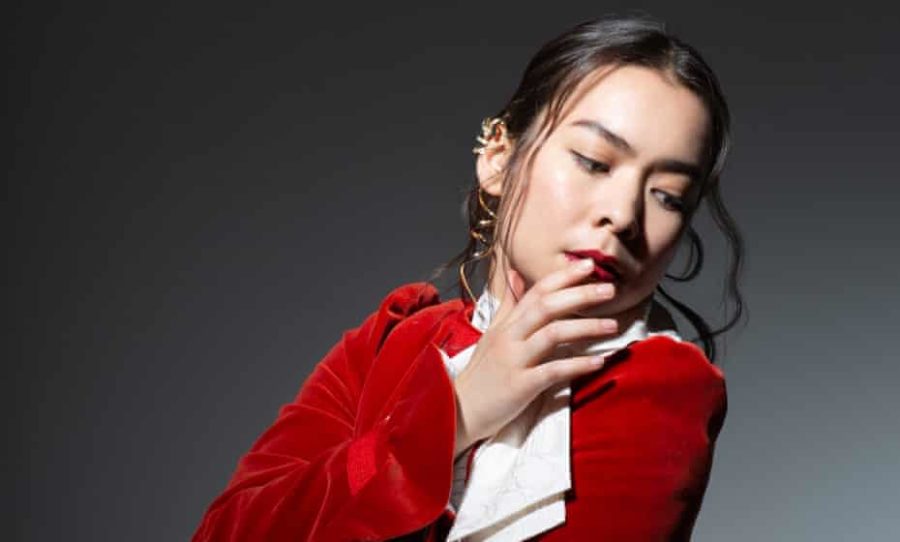“Laurel Hell”
An unanticipated release, Mitski masterfully explores loss, pain and the cost of fame
“I’m like the black hole where people can dump all their sh*t,” singer-songwriter Mitski Miyawaki told Guardian earlier this February, “whether it’s a need for love, or it’s hatred and anger.” On Feb. 4, 2022, Mitski released the black hole back to the audience with her latest album “Laurel Hell.”
After “Be the Cowboy” (2018), with its streams soaring and critics raving (it was named Pitchfork’s album of the year), Miyawaki announced in 2019 that she was going to leave music, supposedly permanently. But the best laid plans often go awry, and later that year she found out she was contractually obligated to pump out one more album with her record label, Dead Oceans.
In this way, “Working for the Knife” was born, the new album’s lead single and lamentation of the creator’s plight in our world of mass production. “Working for the Knife” is about yearning to be free, independent and creative while trapped supporting the very mechanism (the titular knife, a metaphor for the music industry) that restricts those qualities. One of Mitski’s hallmark qualities is her unflinching willingness to say what others won’t. She is working for the knife on “Laurel Hell.” This album is not some golden beacon of inspiration that came to her; it may not even have existed without the knife-sharp obligation of her contract.
It is in this irony that Mitski finds the crux of “Laurel Hell.” Instead of weakening the album, the fact that it wasn’t organically grown but cultivated as a direct result of the system she’s criticizing in “Working for the Knife” strengthens the effect. Mitski found the heart of what she wanted to say then proceeded to tear the chest open and place the organ on a table for all of us to see. The knife has done its job, and the consumer has a new, glimmering piece of media to devour.
Mitski’s discography is teeming with somber, sorrowful, desperate, aching, melancholic, gut-wrenching songs. Nobody (nobody, nobody nobody, nobody) writes a cry song like Mitski, but sometimes I wonder if it’s too much. At what point is she tearing herself to shreds, so we can admire the confetti as it tumbles down? Her songs hurt like an ax-hacking, but does she need to shatter herself into a million pieces so we can watch them sparkle? Mitski said in an interview that “Nobody,” one of her most popular songs from “Be the Cowboy,” spawned from a mental breakdown where all she could do was say the word “nobody” over and over again.
“Laurel Hell” doesn’t feel like Mitski is performing her torture any longer. One of the most intentional contemporary song-writers, Mitski includes each detail and lyric with precision and care, even if it’s not noticeable at first. The first time I listened to “Laurel Hell” all the way through, it was just another Mitski album to me. By the eighth time, I was thoroughly invested in each moment of each song, and still knew there was more to discover. Who else but Mitski could come up with “Trees are swaying in the wind like sea anemones” (from “Heat Lightning”)?
“Laurel Hell” is a study in dichotomy. The title alone epitomizes its duality. A laurel hell, Mitski said on The Zane Lowe Show in November 2021, is a dense thicket of laurel bushes that trap victims, sometimes fatally. It is a brutal image, and yet, “laurel flowers are so pretty,” Mitski said. The thorny pain of the laurel bushes pairs with the glorious bursting laurel buds, just like the range of songs on “Laurel Hell.”
In sound, “Laurel Hell” matches the juxtaposition in the album’s lyrics. The sensation of listening to the album is sour rock candy rolling over your tongue—spiky, sweet and vibrant. At times unnervingly soft, at others loud and distorted, each song brings in a new color from the paint palette of sounds. From the 80s-esque synth beats of “The Only Heartbreaker” and “Should’ve Been Me” to the ominous thrumming of “Heat Lightning” and “I Guess,” Mitski maintains a cohesion that is generously sprinkled with uniqueness.
Clocking in at just over 30 minutes, “Laurel Hell” is an efficiently devastating album with 11 songs that graze over a legion of emotions—guilt, regret, lingering heartache, turmoil, lovelornity, ambivalence, desperation, bitter nostalgia, remorse, maturity and more. If life is a tapestry, Mitski peruses the arras until she finds the most hidden threads, then stretches and plucks them out until the colors are spilling from the fabric.
In theme, Laurel Hell is “Two Slow Dancers” (from “Be the Cowboy”) all over again, except this time the dancing partners aren’t those of a romantic relationship, but Mitski waltzing with music itself—her old (and reignited) flame. Though most of the songs parallel a pair of lovers, the context of the album frames the romantic tragedy to be between Mitski and her music career.
A tragedy fit for Shakespeare, Mitski crafts a story of falling out of music and returning “carefully into the dark” (“Valentine, Texas”). Mitski mourns what she lost of herself in the maelstrom of the music industry, but is paradoxically embracing the machine that forged the storm in the first place by producing the album.
In “That’s Our Lamp,” for example, the narrator gets into a fight with her to-be-ex-lover and runs out of the apartment, just to stare at the lamp from the street through the window, “thinking that’s where you loved me.” But through the pain and the loss, the song is packaged in upbeat production that conveys the relief she feels nonetheless at the end of the relationship. Mitski brilliantly uses the metaphor of a quarreling and inevitably separating couple to portray herself and her career—the complexities of the love and pain and loss.
Despite the ironically dismal origins, “Laurel Hell” is Mitski at her finest. Not only is the album technically flawless, with expertly written songs, but it is a complex piece of media that forces the listener into Mitski’s Hell. As she skillfully and authentically captures the turmoil of a creative’s life, Mitski reluctantly (but with wide, excited eyes) tips back into the black hole herself.

My initials may be eh, but my stories sure aren't! I'll love you forever if you peel me a tangerine.



